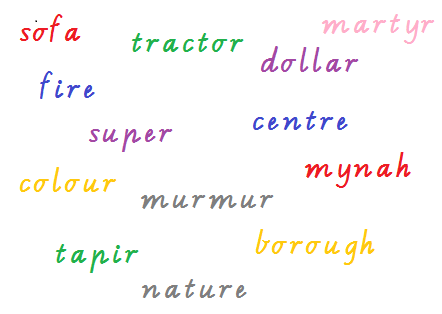The unstressed vowel
6 Replies
One of the hardest things about spelling words with more than one syllable is managing the unstressed vowel (called “schwa” by linguists).
The unstressed vowel is the little “uh” sound we say in “weak” syllables, like the “er” in “water”, the “ar” in “liar”, the “or” in “tractor” or the “a” in “China”. It can be spelt using just about any vowel spelling.
If learners are introduced to long words too quickly, before they have grasped the major vowel spellings in one-syllable words, they can think that this vowel is an “u” sound as in “cut”.
This can make them very confused about how to spell this sound, and how to spell long words generally, since this sound seems to be everywhere in long words.
Another thing which can be really confusing when learning to spell words with more than one syllable is identifying syllable boundaries.
A syllable can be just one letter, or it can be half a dozen or more. Learners need to familiarise themselves with which patterns indicate the end of a syllable, and how to munch their way through long words just one mouthful/syllable at a time, not try to swallow words whole.
I’ve just finished my Level 7 Workbook (update 2019: basic work on this is now in Workbook 3) which contains materials suitable for practising these skills. All the words in it are already “chunked” into syllables for learners, because they have little dots between syllables (often there are two possible places to put a syllable break, in which case I have used the location that is most consistent with the patterns previous workbooks have covered).
These dots take the guesswork for beginners out of where syllable boundaries are, and how many mouthfuls there are in each word. The learner’s job is first to copy the words, then write them independently, without dots, by working through the word one syllable at a time, and sounding out each syllable.
There are many spellings that don’t appear in words of one syllable which are common in longer words, like the “age” in “village”, the “y” in “silly”, the “ture” in “future” and the “ti” in “motion” and “patient”. My Level 7 Workbook also introduces a range of these. Here’s a quick video tour of it:
If you have any feedback on this workbook, or know of other materials that target these skills well but aren’t on my resources list, please let me know and I can add them: spelfabet@gmail.com



very helpful material. I like it as a teacher’s handbook
[…] short reduced vowel sound of the schwa can be taken by any unstressed vowel […]
Nice one
There’s an uh sound in China but I’ve never heard it in water, tractor, or liar. Perhaps on the east coast of the US?
My accent is Australian, and we don’t say final /r/. We say a schwa for final unstressed vowels including liar, water, tapir, tractor and murmur, and even flour. Same goes in the UK and other non-rhotic Englishes.
The unstressed vowel, often overlooked, plays a crucial role in language. In English, it can change the meaning or pronunciation of a word, as in “a” versus “an.” Understanding and mastering the use of unstressed vowels can greatly improve pronunciation and comprehension in both speaking and reading.